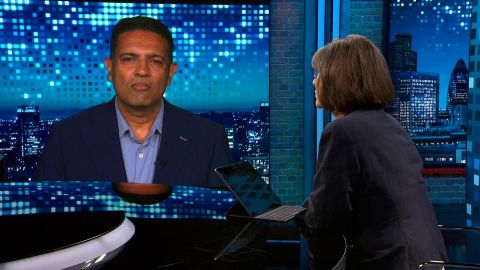Read Transcript EXPAND
CHRISTIANE AMANPOUR, CHIEF INTERNATIONAL ANCHOR: What I want to know is from each one of you, literally, is what keeps you up at night, you are all the experts, for good or for bad? And I’m going to start with you.
NINA SCHICK, AUTHOR, “DEEP FAKES AND THE INFOCALYPSE”: We can conceive of it as us being now on the cusp, I think, of a profound change in our relationship to machines that’s going to transform the way we live, transform the way we work, even transform our very experience of what it means to be human. That’s how seismic this is. If you consider the exponential technologies of the past 30 years, the so- called technologies of the information age, from the internet, to cloud, to the smartphone, it’s all been about building a digital infrastructure and a digital ecosystem, which has become a fundamental tenet of life. However, A.I. takes it a step further. With A.I., and in particular, generative A.I., which is what I have been following and tracking for the last decade, you are really looking at the information revolution, becoming an intelligence revolution, because these are machines that are now capable of doing things that we thought were only unique to human creativity, into human intelligence. So, the impacts of this as a whole for the labor market, for the way we work, for the way that — the very framework of society unfolds is just so important. My background is in geopolitics, where I kind of advice global leaders for the better half of two decades. And the reason I became interested in A.I. is not because I have a tech background, I have a background assessing trends for humanity. This isn’t about technology, this is ultimately a story for humanity and how we decide this technology is going to unfold in our companies, so within enterprise, very exciting, but also, society writ large. And the final thing I would say is, we have agency. A lot of the debate has been about A.I. autonomously taking over, and I just want to kind of divorce that kind of hypothetical scenario with the reality, and that is, we decide.
AMANPOUR: Connor, though you believe — because we have spoken before — that actually these machines are going to be so powerful and so unable to control by human input that they actually could take over.
CONNOR LEAHY, CEO, CONJECTURE: Unfortunately, I do think that this is a possibility. In fact, I expect this default probability. But I would like to agree with Nina fully, that we do agency, that doesn’t have to happen. But you asked a question earlier, what keeps me up at night? And I guess, what I would say what keeps me up at night is that a couple million years ago, the common ancestor between chimpanzees and humans split into two subspecies. One of these developed a roughly three times larger brain than the other species. One of them goes to the moon and builds nuclear weapons. One of them doesn’t. One of them is at the complete mercy of the other and one of them has full control. I think this kind of relationship to very powerful technology can happen. I’m not saying (INAUDIBLE) it is the default outcome unless we take our agency, we see that we are in control, we are the ones building these technologies, and as a society, we decide to go a different path.
AMANPOUR: So, to follow up on that, the same question to you but from the point of view of how do we have agency, express agency and regulate? You’re a private entrepreneur, you also have been on the government, the British government sort of regulation council.
PRIYA LAKHANI, CEO, CENTURY Tech: Yes.
AMANPOUR: What will it take to ensure diversity, agency, and that the machines don’t take over?
LAKHANI: Well, what it takes to ensure that is, it’s a lot of work and there’s lots of ideas, there’s lots of theories there are white papers, there is the pro innovation regulation review that I worked on with Supachya Volunteer (ph) in the U.K. The U.S. government has been issuing guidance. The E.U. is issuing its own laws and guidance. But what we want to see is execution, Christiane. And, you know, on the sort what keeps you up at night, I felt sorry for my husband because actually while I — what keeps me up is actually other issues, such as things like disinformation with generative A.I. And I’ve got two children who are 11 and 13, are they going to grow up in a world where they can trust information and what is out there, or are these technologies, because of lack of execution, on the side of policymakers, means that actually it’s sort of a free-for-all, you know, bad actors have access to this technology and you don’t know what to trust? But actually, the biggest thing that keeps me up at night is a flip from what we’ve heard here. It’s, are we — as a human race, are we going to benefit from the opportunities that artificial intelligence also enables us, you know, to have? So, we often talk — and Christiane, you know, forgive me, but for the last six months it’s all been about ChatGPT in generative A.I. That is really important. And that’s where a lot of this discussion should be placed. But we also have traditional A.I. So, we have artificial intelligence where we have been using data, we have been classifying, we have been predicting, we have been looking at scans and spotting cancer where we’ve got lack of radiologists, right, and we can augment radiology, we can augment teaching and learning. So, how are we also going to ensure that all around society we don’t actually exacerbate the digital divide, right, but we leverage artificial intelligence, what the best it can provide to help us in the areas of health care, education, security. So, you know, it’s scary to think we are not using it to its full advantages while we also must focus on the risks and the concerns. And so, really, I sort of have this jewel sort of what keeps me up at night, as I said, I sort of feel sorry for my husband because I’m sort of tapping on his shoulder going, and what about this and what about that?
WENDY HALL, PROFESSOR OF COMPUTER SCIENCE: We really need many different voices helping us build and designed these systems and make sure they are safe, not just the technical teams that are working at the companies to build the A.I., talking to the governments about we need women, we need age range, we need diversity from different subject areas, we need lots of different voices, and that’s what keeps me awake at night.
About This Episode EXPAND
Christiane hosts a panel of leaders in the field of artificial technology. In a world where it’s increasingly hard to discern fact from fiction, Hari Sreenivasan and Christiane Amanpour discuss the ethical dilemmas of A.I., and why it’s more important than ever to keep real journalists in the game.
LEARN MORE

